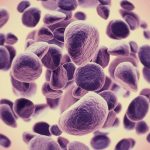Edited By NODE SMITH, ND
From The Mount Sinai Hospital / Mount Sinai School of Medicine- Mount Sinai researchers have solved a major mystery in cancer research: How cancer cells remain dormant for years after they leave a tumor and travel to other parts of the body, before awakening to create metastatic cancer.
According to findings reported in Nature Cancer in December, the cells remain quiet by secreting a type of collagen, called type III collagen, in the environment around themselves, and only turn malignant once the level of collagen tapers off. The researchers found that by enriching the environment around the cells with this collagen, they could force the cells to remain in a dormant state and prevent tumor recurrence.
“Our findings have potential clinical implications and may lead to a novel biomarker to predict tumor recurrences, as well as a therapeutic intervention to reduce local and distant relapses,” said senior author Jose Javier Bravo-Cordero, PhD, Associate Professor of Medicine (Hematology and Medical Oncology) at The Tisch Cancer Institute at Mount Sinai. “This intervention aimed at preventing the awakening of dormant cells has been suggested as a therapeutic strategy to prevent metastatic outgrowth.As the biology of tumor dormancy gets uncovered and new specific drugs are developed, a combination of dormancy-inducing treatments with therapies that specifically target dormant cells will ultimately prevent local recurrence and metastasis and pave the way to cancer remission.”
Most cancer deaths are due to metastases, which can occur several years after a tumor is removed. Previous research has studied how dispersed tumor cells come out of dormancy; this new work showed how the cells remain dormant.
The study used high-resolution imaging techniques, including intravital two-photon microscopy, a technology that allows the visualization of dormant cells in their environment in real time in a living animal. This technology allowed the researchers to track dormant tumor cells in mouse models using breast and head and neck cancer cell lines. By using this technology, the researchers were able to visualize the changes in the architecture of the extracellular matrix as tumor cells became dormant and how it changed when these cells awoke.
In patient samples, the researchers showed that an abundance of the collagen could be used as a potential measurement to predict tumor recurrence and metastasis. In the mouse models, when scientists increased the amount of type III collagen around cancer cells that had left a tumor, cancer progression was interrupted and the disseminated cells were forced into a dormant state. Similar to wound treatment, in which collagen scaffolds have been proposed as a therapeutic alternative for complex skin wounds, this study suggest that by using strategies that aim to enrich the tumor microenvironment in type III collagen, metastasis may be prevented by activating tumor cell dormancy.
1. Julie S. Di Martino, Ana Rita Nobre, Chandrani Mondal, Isra Taha, Eduardo F. Farias, Elana J. Fertig, Alexandra Naba, Julio A. Aguirre-Ghiso, Jose Javier Bravo-Cordero. A tumor-derived type III collagen-rich ECM niche regulates tumor cell dormancy. Nature Cancer, 2021; DOI: 10.1038/s43018-021-00291-9

Node Smith, ND is a naturopathic physician in Humboldt, Saskatchewan and associate editor and continuing education director for NDNR. His mission is serving relationships that support the process of transformation, and that ultimately lead to healthier people, businesses and communities. His primary therapeutic tools include counselling, homeopathy, diet and the use of cold water combined with exercise. Node considers health to be a reflection of the relationships a person or a business has with themselves, with God and with those around them. In order to cure disease and to heal, these relationships must be specifically considered. Node has worked intimately with many groups and organizations within the naturopathic profession, and helped found the non-profit, Association for Naturopathic Revitalization (ANR), which works to promote and facilitate experiential education in vitalism.





